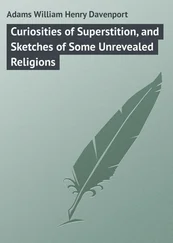William Adams - Witch, Warlock, and Magician
Здесь есть возможность читать онлайн «William Adams - Witch, Warlock, and Magician» — ознакомительный отрывок электронной книги совершенно бесплатно, а после прочтения отрывка купить полную версию. В некоторых случаях можно слушать аудио, скачать через торрент в формате fb2 и присутствует краткое содержание. Жанр: foreign_prose, foreign_language, на английском языке. Описание произведения, (предисловие) а так же отзывы посетителей доступны на портале библиотеки ЛибКат.
- Название:Witch, Warlock, and Magician
- Автор:
- Жанр:
- Год:неизвестен
- ISBN:нет данных
- Рейтинг книги:3 / 5. Голосов: 1
-
Избранное:Добавить в избранное
- Отзывы:
-
Ваша оценка:
- 60
- 1
- 2
- 3
- 4
- 5
Witch, Warlock, and Magician: краткое содержание, описание и аннотация
Предлагаем к чтению аннотацию, описание, краткое содержание или предисловие (зависит от того, что написал сам автор книги «Witch, Warlock, and Magician»). Если вы не нашли необходимую информацию о книге — напишите в комментариях, мы постараемся отыскать её.
Witch, Warlock, and Magician — читать онлайн ознакомительный отрывок
Ниже представлен текст книги, разбитый по страницам. Система сохранения места последней прочитанной страницы, позволяет с удобством читать онлайн бесплатно книгу «Witch, Warlock, and Magician», без необходимости каждый раз заново искать на чём Вы остановились. Поставьте закладку, и сможете в любой момент перейти на страницу, на которой закончили чтение.
Интервал:
Закладка:
‘Then, after some devout prayer, with a smiling countenance he desired the executioner to proceed. Tears gushed from the eyes of Herbert when he beheld him so willing to die, and saw that no ingenuity could wrest his secret from him. He gave orders for his release. His imprisonment and threatened execution were contrived without the King’s knowledge to intimidate him into compliance. The iniquitous devices having failed, Herbert did not dare to take away his life. Dalton rose from the block with a heavy countenance, and returned to his abbey, much grieved at the further prolongation of his earthly sojourn. Herbert died shortly after this atrocious act of tyranny, and Debois also came to an untimely end. His father, Sir John Debois, was slain at the battle of Tewkesbury, May 4, 1471; and two days after, as recorded in Stow’s “Annales,” he himself (James Debois) was taken, with several others of the Lancastrian party, from a church where they had fled for sanctuary, and was beheaded on the spot.’
The ancient magic included various kinds of divination, of which the principal may here be catalogued:
Aeromancy , or divination from the air. If the wind blew from the east, it signified good fortune (which is certainly not the general opinion!); from the west, evil; from the south, calamity; from the north, disclosure of what was secret; from all quarters simultaneously (!), hail and rain.
Axinomancy , practised by the Greeks, more particularly for the purpose of discovering criminals. An axe poised upon a stake, or an agate on a red-hot axe, was supposed by its movement to indicate the offender. Or the names of suspected persons were called out, and the movement of the axe at a particular name was understood to certify guilt.
Belomancy , in use among the Arabs, was practised by means of arrows, which were shot off, with written labels attached to them; and the inscription on the arrow first picked up was accepted as prophetic.
Bibliomancy , divining by means of the Bible, survived to a comparatively recent period. The passage which first caught the eye, on a Bible being opened haphazard, was supposed to indicate the future. This was identical with the Sortes Virgilianæ , the only difference being that in the latter, Virgil took the place of the Bible. Everybody knows in connection with the Sortes the story of Charles I. and Lord Falkland.
Botanomancy , divining by means of plants and flowers, can hardly be said to be extinct even now. In Goethe’s ‘Faust,’ Gretchen seeks to discover whether Faust returns her affection by plucking, one after another, the petals of a star-flower ( sternblume , perhaps the china-aster), while she utters the alternate refrains, ‘He loves me!’ ‘He loves me not!’ as she plucks the last petal, exclaiming rapturously, ‘He loves me!’ According to Theocritus, the Greeks used the poppy-flower for this purpose.
Capnomancy , divination by smoke, the ancients practised in two ways: they threw seeds of jasmine or poppy in the fire, watching the motion and density of the smoke they emitted, or they observed the sacrificial smoke. If the smoke was thin, and shot up in a straight line, it was a good omen.
Cheiromancy (or Palmistry), divination by the hand, was worked up into an elaborate system by Paracelsus, Cardan, and others. It has long been practised by the gipsies, by itinerant fortune-tellers, and other cheats; and recently an attempt has been made to give it a fashionable character.
Coscinomancy was practised by means of a sieve and a pair of shears or forceps. The forceps or shears were used to suspend a sieve, which moved (like the axe in axinomancy) when the name of a guilty person was mentioned.
Crystallomancy , divining by means of a crystal globe, mirror, or beryl. Of this science of prediction, Dr. Dee was the great English professor; but the reader will doubtless remember the story of the Earl of Surrey and his fair ‘Geraldine.’
Geomancy , divination by casting pebbles on the ground.
Hydromancy , divination by water, in which the diviner showed the figure of an absent person. ‘In this you conjure the spirits into water; there they are constrained to show themselves, as Marcus Varro testifieth, when he writeth how he had seen a boy in the water, who announced to him in a hundred and fifty verses the end of the Mithridatic war.’
Oneiromancy , divination by dreams, is still credited by old women of both sexes. Absurdly baseless as it is, it found believers in the old time among men of culture and intellectual force. Archbishop Laud attached so much importance to his dreams that he frequently recorded them in his diary; and even Lord Bacon seems to have thought that a prophetic meaning was occasionally concealed in them.
Onychomancy , or Onymancy , divination by means of the nails of an unpolluted boy.
Pyromancy , divination by fire. ‘The wife of Cicero is said, when, after performing sacrifice, she saw a flame suddenly leap forth from the ashes, to have prophesied the consulship to her husband for the same year.’ Others resorted to the blaze of a torch of pitch, which was painted with certain colours. It was a good omen if the flame ran into a point; bad when it divided. A thin-tongued flame announced glory; if it went out, it signified danger; if it hissed, misfortune.
Rabdomancy , divination by the rod or wand, is mentioned by Ezekiel. The use of a hazel-rod to trace the existence of water or of a seam of coal seems a survival of this practice. But enough of these follies:
‘Necro-, pyro-, geo-, hydro-, cheiro-, coscinomancy,
With other vain and superstitious sciences.’
CHAPTER II
THE STORY OF DR. JOHN DEE
The world must always feel curious to know the exact moment when its great men first drew the breath of life; and it is satisfactory, therefore, to be able to state, on the weighty authority of Dr. Thomas Smith, that Dr. John Dee, the famous magician and ‘philosopher,’ was born at forty minutes past four o’clock on the morning of July 13, 1527. According to the picturesque practice of latter-day biographers, here I ought to describe a glorious summer sunrise, the golden light spreading over hill and pasture, the bland warm air stealing into the chamber where lay the mother and her infant; but I forbear, as, for all I know, this particular July morning may have been cloudy, cold, and wet; besides, John, the son of Rowland Dee, was born in London. From like want of information I refrain from comments on Master Dee’s early bringing-up and education. But it is reported that he gave proof of so exceptional a capacity, and of such a love of letters, that, at the early age of fifteen, he was sent to the University of Cambridge, to study the classics and the old scholastic philosophy. There, for three years, he was so vehemently bent, he says, on the acquisition of learning, that he spent eighteen hours a day on his books, reserving two only for his meals and recreation, and four for sleep – an unhealthy division of time, which probably over-stimulated his cerebral system and predisposed him to delusions and caprices of the imagination. Having taken his degree of B.A., he crossed the seas in 1547 ‘to speak and confer’ with certain learned men, chiefly mathematicians, such as Gemma Frisius, Gerardus Mercator, Gaspar a Morica, and Antonius Gogara; of whom the only one now remembered is Mercator, as the inventor of a method of laying down hydrographical charts, in which the parallels and meridians intersect each other at right angles. After spending some months in the Low Countries he returned home, bringing with him ‘the first astronomer’s staff of brass that was made of Gemma Frisius’ devising, the two great globes of Gerardus Mercator’s making, and the astronomer’s ring of brass (as Gemma Frisius had newly framed it).’
Читать дальшеИнтервал:
Закладка:
Похожие книги на «Witch, Warlock, and Magician»
Представляем Вашему вниманию похожие книги на «Witch, Warlock, and Magician» списком для выбора. Мы отобрали схожую по названию и смыслу литературу в надежде предоставить читателям больше вариантов отыскать новые, интересные, ещё непрочитанные произведения.
Обсуждение, отзывы о книге «Witch, Warlock, and Magician» и просто собственные мнения читателей. Оставьте ваши комментарии, напишите, что Вы думаете о произведении, его смысле или главных героях. Укажите что конкретно понравилось, а что нет, и почему Вы так считаете.











